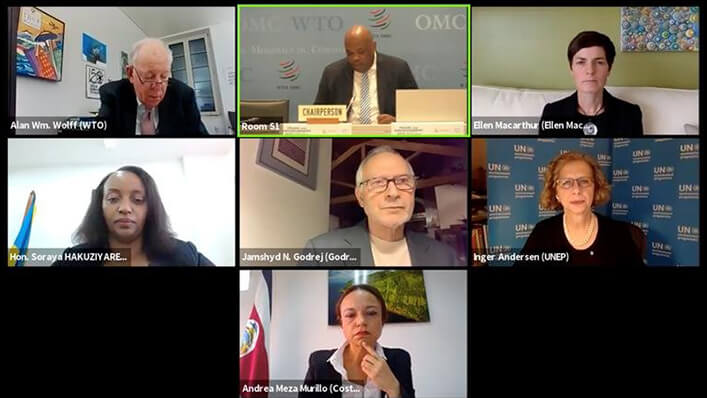
Our Projects are
Transforming African Trade
Quick Contacts
2nd Floor, Fidelity Insurance Centre Waiyaki Way, Westlands

Trade and environmental policies working in concert are vital for unlocking a sustainable recovery from the COVID-19 crisis and ensuring future resilience to climate change and other environmental disruptions, speakers said at the 16 November online high-level event organized by the WTO and the UN Environment Programme as part of Trade and Environment Week 2020. Policy makers must use the current window of opportunity to build back a greener and more inclusive global economy, they said.
“The pandemic has become a stark reminder that nature, human health and the economy are not separate. Rather, they are intimately connected,” WTO Deputy Director-General Alan Wolff said. “The right trade policies would help us not only to get back on track and recover some of the time lost to the crisis from an economic perspective, but also to shift toward a more sustainable and inclusive future,” he said.
DDG Wolff highlighted areas where the WTO has acted in support of sustainable trade and where members could redouble efforts to make further progress, highlighting trade opening in environmental goods and services, new initiatives to intensify trade and environment discussions and help combat plastic pollution, Aid for Trade, and further collaboration with the environmental community. His full remarks are available here.
UN Environment Programme Executive Director Inger Anderson affirmed the importance of collaboration.
“We are very committed to our partnership with WTO, all the more so when we see the shock the pandemic has caused. Having ministers of environment and trade engage together becomes absolutely critical to ensure that trade policies and environmental policies are working together,” she said, noting that the pandemic is but an overture for future crises if natural systems are left to collapse.
Ms Anderson also underlined the need to ensure that a green transition does not leave smaller stakeholders behind. Developing countries should be supported in their efforts to advance both environmental and trade opportunities, she said.
Indeed, enterprises in developing countries often face challenges in accessing environmentally friendly technology and financial resources, said Soraya Hakuziyaremye, Rwanda Minister of Trade and Industry. Sustainability targets, however, can be fulfilled through a comprehensive development approach which acknowledges links between environment and trade policies, said Andrea Meza Murillo, Costa Rica Minister of Environment and Energy.
The business sector, furthermore, will need clear and fair regulations to stimulate positive change, speakers said. Studies show that there is significant economic value in transitioning from a linear economy to a circular one, said Ellen MacArthur, the founder and chair of trustees of the Ellen MacArthur Foundation. She also said that setting a level playing field is fundamental for encouraging businesses to work towards sustainability goals and that trade rules and product standards through cooperation at the WTO will be important in this equation.
Competition policy is also important to allow smaller players to participate, said Jamshyd Godrej, Chairman of the Board of Godrej & Boyce Manufacturing Company Limited, India. He also emphasized that it is necessary to find the so-called “win-win-win” solutions for businesses, nature and consumers. If policymakers work with the supply chain and with these issues, they can get a good amount of traction in that direction, he said.
In closing the event, Ambassador Chad Blackman of Barbados, chair of the WTO Committee on Trade and Environment, said: “We should never waste a good crisis. Now is the time for us to reimagine a global economy that is sustainable and brings prosperity for all but in a way that does not harm the environment and does not inhibit the progress of trade and growth.”
Read the original article
Disclaimer: The views and opinions expressed in this article are those of the authors and do not necessarily reflect the official policy or position of TradeMark Africa.